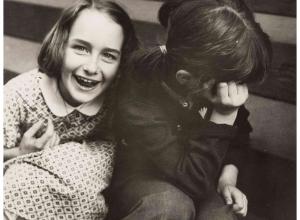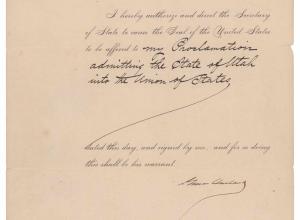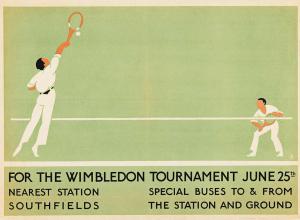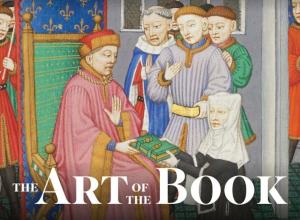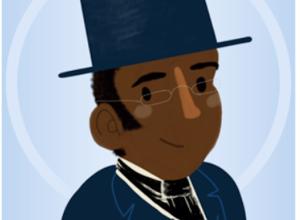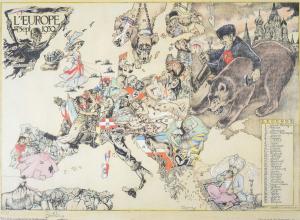Bright Young Booksellers: Mark Wiltshire
Our Bright Young Booksellers series continues today with Mark Wiltshire, Associate Specialist in the Books & Manuscripts department at Christie's in London.
 How did you get started in rare books?
How did you get started in rare books?
My first introduction to rare books came at university when I called one up from the stacks of the Bodleian Library. It was an 18th-century book of doggerel which I'd discovered down a rabbit-hole of research for an essay. I remember being surprised that it was handed over to me with very few questions asked; it seemed too precious to be let out of the librarian's sight. Nowadays, I regularly handle books of greater rarity, age, and commercial value but that first sense of awe has stuck with me.
Out of university, I was very lucky to be offered an internship with the Wordsworth Trust in Grasmere, where I had my first taste of cataloguing while working with the autograph letters of Thomas Bewick. Soon after, I began working with Robert Frew, the well-known dealer and past ABA president, based in South Kensington. It is to him that I owe my proper introduction to the world of rare books, its major characters, its written and unwritten rules, and the first stirrings of an instinct for a good book. I was then offered the incredible opportunity to join the Books and Manuscripts department at Christie's, where I have been working for two years.
What is your role at Christie's?
I am an Associate Specialist in printed books. My role encompasses various aspects of the auction process, from business-getting to catalogue and exhibition design, with a large amount of researching and cataloguing in between. I am privileged to handle an exceptionally wide variety of printed material but I have a particular focus on English Literature.
What do you love about the auction business?
Apart from the obvious excitement of sale day, the best thing about working in the auction business is the constant renewal of material. Holding numerous sales per year means that I am always working on something new and unusual, which I consider to be the best way of growing my expertise. Christie's has such a wide range of specialist knowledge in over 60 specialist departments that the opportunities to learn about art and the art market seem endless.
Describe a typical day for you:
The auction business is seasonal, so my typical day will vary from month to month. Now, at the height of the auction season, my day typically revolves around meeting and messaging our clients, answering their questions, and generally showing off the lots on offer. At other times of the year, my focus will shift to traveling and visiting collections, to cataloguing, and so on. It's one big cycle.
Favourite rare book that you've handled?
My favourite book that I've handled is actually being offered here in London on 12 December. It is John Clare's copy of the first edition of John Keats's Endymion: an extraordinary association copy linking two of the great English poets. As somebody with an academic background in the Romantic poets, the discovery of this book was just thrilling. Bound in full crushed-morocco by the Doves Bindery, it is, to quote the poem's opening line, 'a thing of beauty'.
What do you personally collect?
The problem with working at Christie's is that I've cultivated a taste that far exceeds my means. So, for the moment, I'm content with helping to grow other collections rather than building my own.
What do you like to do outside of work?
I like to spend time exploring the city with my partner Alanna. I've lived in London my whole life but there is still so much of it left to know. Like the auction world, London offers a constant sense of renewal. We read a lot, especially poetry, and I write occasionally too. Supporting Tottenham Hotspur also occupies more time and energy than I care to admit.
Thoughts on the present state and/or future of the rare book trade?
The market seems to be in very good health and collectors are collecting enthusiastically. In the future, I hope and expect to see the growth of new markets focusing on hitherto neglected materials that can be rightly celebrated for their cultural importance, beauty, and rarity. There is a strong group of intelligent and innovative young booksellers in the UK, many of whom work with established dealers and auction houses, while some have set up their own enterprises. While I cannot predict the future, I am confident that the trade will be led very ably in the years to come.
Any upcoming sales you're particularly excited about?
Our Valuable Books and Manuscripts sale on 12 December includes some astonishingly good lots. I'm thinking in particular about Adam Smith's own copy of the Wealth of Nations (est. £500,000-800,000), a presentation copy of the first edition of Karl Marx's Das Kapital (est. £150,000-250,000) and the two autograph sledging journals of Tryggve Gran (est. £120,000-180,000), an extremely important piece of Polar history.
[Image credit: Christie's]





